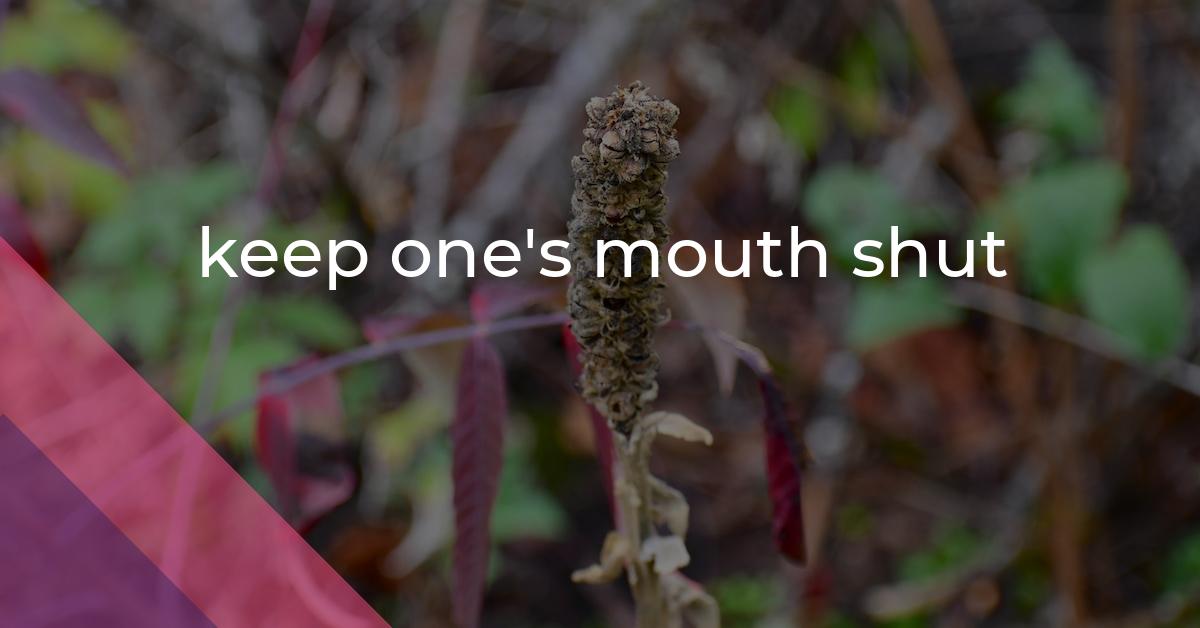keep one’s mouth shut: Idiom Meaning and Origin
What does ‘keep one's mouth shut’ mean?
The idiom "keep one's mouth shut" means to remain silent or not reveal information, often to avoid causing trouble or trouble for oneself. It emphasizes the importance of not speaking or disclosing something that should remain secret or private.

Idiom Explorer
The idiom "keep the peace" means to maintain harmony, calm, and order in a situation or relationship, usually by preventing conflict or resolving disputes.
The idiom "keep shtum" means to remain silent or keep quiet about something, especially when it is important or could cause trouble if revealed.
The idiom "keep quiet" means to remain silent or not speak, especially when it is important to do so in order to maintain secrecy, avoid trouble, or not reveal information.
The idiom "keep one's pants on" means to remain calm, patient, or to refrain from becoming overly excited or impulsive in a given situation.
The idiom "keep one's options open" means to refrain from making a final decision or commitment in order to have the freedom to choose from different possibilities or alternatives.
The idiom "keep one's lips sealed" means to keep quiet or not reveal a secret or confidential information.
The idiom "keep one's head down" means to avoid drawing attention or staying out of trouble in order to stay safe or unnoticed in a dangerous or difficult situation.
The idiom "keep one's head" means to remain calm and think clearly in a difficult or stressful situation.
The Power of Silence
The idiom "keep one's mouth shut" is often used to encourage silence or the act of not divulging information. Its literal meaning suggests physically closing one's mouth, but its figurative interpretation urges a person to refrain from speaking or sharing certain information. Etymologically speaking, the origin of this idiom can be traced back to ancient times when verbal communication held considerable power. In societies where gossip, intrigue, and deception were rampant, knowing when to speak and when to remain silent could be a matter of life or death. "Silence is golden" may reverberate within this idiom, emphasizing the value of withholding potentially harmful or sensitive information.
How does this idiom fare in the cultural landscape of the United States? The American emphasis on individual freedoms and the protection of privacy may contribute to the prevalence of this idiom in both formal and informal settings. In a society where the right to privacy is highly regarded, the act of keeping one's mouth shut can be seen as an act of self-preservation and self-control. However, there is also an underlying sense of ethical responsibility associated with this idiom. It embodies the notion that sometimes, withholding information is the morally upright thing to do, particularly when sharing it could lead to harm or betrayal.
When we consider the related idiom "keep one's lips sealed," we find another way to express the same idea. By encouraging someone to keep their lips sealed, we are emphasizing the importance of discretion and maintaining confidentiality. This idiom reinforces the notion that there are times when it is best to remain silent, protecting the trust and privacy of others. It highlights the need to keep certain information to oneself, even when it may be tempting to share it.
Similarly, the idiom "keep quiet" shares a common sentiment with "keep one's mouth shut." Both idioms urge individuals to refrain from speaking or making noise, particularly in situations where it is necessary to maintain a sense of secrecy or avoid attracting attention. However, "keep quiet" may also imply a sense of maintaining peace or avoiding conflict by choosing not to engage in verbal arguments or disagreements. Both idioms underscore the value of silence and self-restraint in different contexts.
Another related idiom, "keep shtum," offers a more colloquial and informal way to express the idea of keeping one's mouth shut. This idiom draws from British slang and shares a similar meaning to its counterparts. "Shtum" is derived from Yiddish and implies keeping quiet or silent, particularly in situations where it is essential not to reveal or discuss sensitive information. "Keep shtum" highlights the need for discretion and restraint in a more casual manner.
Although the idiom "keep one's mouth shut" seeks to promote silence as a virtue, it also invites us to ponder the potential consequences of doing so. By urging us to consider when speaking out is necessary and when it may be wiser to remain silent, this idiom poses a delicate balance between the virtues of honesty and discretion. It reminds us that there are moments when silence is not only acceptable but also preferable, allowing us to protect ourselves and others from unnecessary harm or betrayal.
Yet, even as we explore the depths of this idiom's meaning, there remains an enigmatic quality that lingers. How does one decipher precisely when to keep one's mouth shut? Is it an absolute rule, or are there exceptions to consider? These lingering questions hint at the complexity and nuance surrounding idioms, offering an invitation to continue exploring the possibilities they hold within their concise and evocative phrases.
Example usage
Examples of how the idiom 'keep one's mouth shut' can be used in a sentence are:
- He knew all the secrets, but he kept his mouth shut.
- The witness was instructed to keep his mouth shut about the event.
- She realized she had said too much and quickly tried to keep her mouth shut.
More "unclear" idioms
We missed the mark - nothing found.



